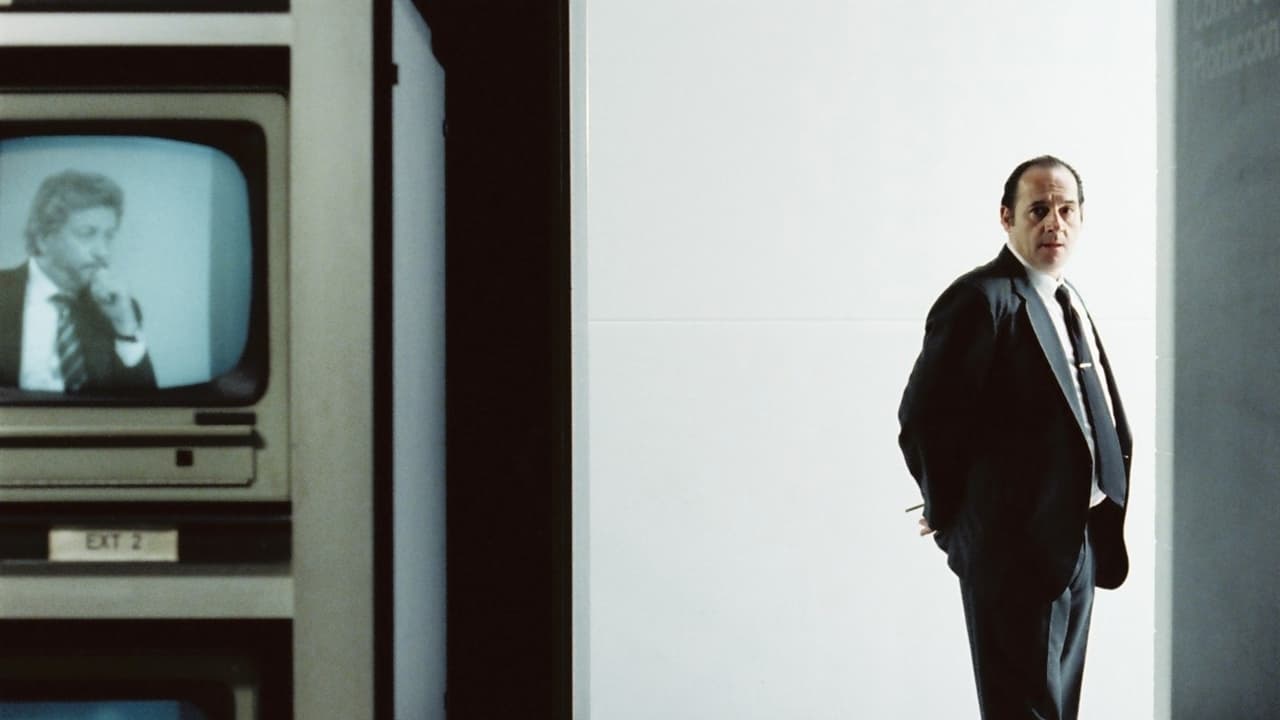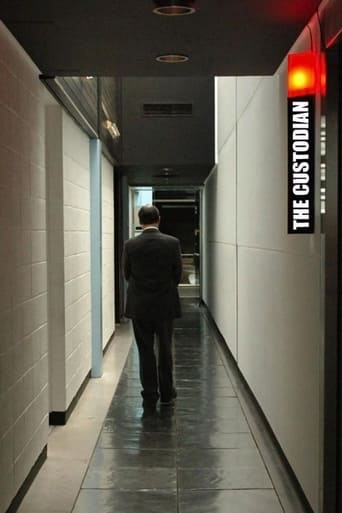



Who payed the critics
Sick Product of a Sick System
Good start, but then it gets ruined
Good concept, poorly executed.
Ruben, a bodyguard, for Artemio, the minister of planning in Argentina, is a man whose work appears to be waiting incessantly for a man that regards him as an imposed nuisance, a speck of dust on the floor, to put it mildly. In other word, Ruben, even though he is doing a job, what he does is not appreciated by his cold boss. There is never any meaningful exchange of ideas between the men, let alone any semblance of civility toward the man that is perhaps a step above a servant.This lonely man is constantly pacing outside the rooms where the meetings that demand the minister's presence takes place. He must stay alert, even when the boss is clearly seen with a lover through a window. Ruben's duty include guarding the minister as he entertains in his country estate, where he is seen as an intrusion no one in the household acknowledge. The only time we see any type of conversation involves a visiting foreign couple that are guests in the country. Wanting to impress the visitors, Artemio asks his bodyguard to sketch the visiting friend. It is made clear just by watching his morning routine that Ruben does not have any life of his own. He lives for his job. We follow Ruben as he visits his sister Beatriz in a hospital. It becomes clear the woman has some mental problems. Ruben, patiently listens to her rant, but never becomes involved in what the woman is saying. Ruben meets with his sister, and niece, and some guests at a Chinese restaurant, where Beatriz is not happy with the table they were given. She wants to move things around, something that exasperates her brother, complicated by the fact she wants her daughter, who has prepared a number, to sing it for her uncle, which she does so bad, no one in his right mind could endure.The only relief Ruben has is sexual release with a prostitute. He does it through a pimp, we see him following through a commercial gallery. The woman lives at home with her old mother, who is in a separate room as Ruben gets into the apartment. We watch the old woman coming to close the door of her daughter's room, as though she knows what is really going on.Things come to an unexpected end when Artemio suffers what appears to be a mild heart attack. Taken to a hospital, Ruben, who was reprimanded for not being in his post by one of the minister's aides, must stand guard outside the room. We watch Ruben's accumulated anger get the best of him in a surprising turn we were not even anticipating. Ruben's quest becomes to drive toward the ocean, something he never has experienced.Rodrigo Moreno the writer-director of "El Custodio" understood perfectly the character of the man at the center of the story. Life has passed Ruben by. He is an ordinary man who suffers from chronic loneliness, which he cannot shake, but in accepting what life has given him, he is ignored, belittled, and treated like dirt by a system that wants only achievers and idols, something which he is not. The anger that has been bottled inside Ruben finally gets the best of him in ways that should not surprise anyone, because one saw it coming all the time.Getting Julio Chavez to portray Ruben, the director could not have asked for more perfection. Mr. Chavez, one of the best actors from Argentina, gives a masterful performance in a film without dialogue. We only see Ruben talk on a few occasions. The actor clearly understood what his character was going through in the way he looks at the situation at hand. We had greatly enjoyed him in the two seasons of the great series "Epitaphs" one of the best entries in television from Argentina. Osmar Nunez is seen as Artemio in a subdued form. Cristina Villamor has some good moments as Beatriz.Barbara Alvarez was credited as the cinematographer of the film. She captures the nuances of what Mr. Moreno wanted to show in clear takes that shows a different Buenos Aires than the tourists get to see. Federico Jusid contributed the music score. This is the first film by Rodrigo Moreno we have seen. One can only wish this talented man a great career in the cinema and perhaps another collaboration with the excellent Julio Chavez is in order.
View MoreAnother Argentinian film that copies everything done before regarding shots and framing. Is like they all come from a film school that shows to the pupils films from the sixties and then, all of them copy here and there a shot. Amazing!. The real Argentinian cinema is Sorin and Agresti, the rest just plays with the ignorance of local film critics and snob festivals. Do this director has something original to offer?? The film is a bore, pretentious in simplicity. The pathetic thing shows that the director just wanted to show how much can copy but have nothing to say, absolutely nothing more than try to jump the leap and become a Fassbinder or any master sadly forgotten. Wake up people, take a look to the old masters and stop being amaze about things that already exist long long time ago.
View MoreWell, here again we have a variety of reactions to a movie. I found this film brilliant. Of course it was slow but that was a main point. But boring?..For me, not at all. I acknowledge that others have found it boring, but I most certainly did not. For me, it was a deep insight into our society and the shallowness of some of those in it, and into a man's mind as he is so ignored by it. No-one around him recognizes the humanity under his exterior...and certainly would not expect, understand (or care) about what lead him to implode. It is a brilliantly executed film...in my opinion. The superb acting in the film of the main actor reminds me of the acting of the Secret Policeman in the recent German film, The Lives of Others. ...So much is conveyed by few words and movement..but what emotion there is! I highly recommend both films to readers here.
View More"Extraño" is the name of the film I saw last year with Julio Chávez in the starring role. Directed by Santiago Loza, it followed the life of a mysterious man and the woman he fell in love with. At eighty minutes or so, the picture seemed too pretentious and desperate to achieve its hour and twenty minutes of duration With a heavy and repetitive piano as the soundtrack, "Extraño" has a lot of similarities with Rodrigo Moreno's "El Custodio".It's definitely a less pretentious project, but nevertheless risky. It's hard to get people and critics to like this type of contemplative cinema today, mostly in Argentina. Because contemplation is the best word that suits "El Custodio"; a very strong observation of a minister's (Osmar Nuñez) bodyguard's life. This man is Rubén, a character more silent than Chávez' "Extraño" and "Un oso rojo" together.If you remember well, Rubén was also the name of the actor's role in the latter movie, a fabulous tale by Adrián Caetano. However, this Rubén required more commitment from the genius, because the mesmerizing portrayal is focused on the patience and the body movement almost completely Truly; his character barely speaks.There we arrive to the director's script, which shows the minister Chávez protects discussing politic issues that we don't even pay attention to; since Moreno's writing is more about the environment than about the situation. To be honest, nothing really deep happens in the movie; everything is routine as the main character's life, except for a visit to a country house, where the minister invites a French politician and asks Rubén (who draws) to make a portrait of him. "Very good", they tell him. "Thank you", he says, and he leaves.Moreno's direction is also about the environment. The man's picture has the biggest count of still shots I'll probably see this year. The repeated frames of Chávez drinking water and following the minister everywhere got him recognition in the festival of Berlin and a lot of nominations to Argentina's most important awards.What happened is that Moreno's father in-law became a minister, so he decided to join his bodyguards on their daily activities, filming them. "The bodyguards follow the minister; they don't know where he is going They don't care", Moreno says in a short documentary about "El Custodio". "What happens inside their minds? What do they feel? This is what this movie is about".The ending is as mythic as the rest of the movie. Something to think about for a while and maybe watch the slow film one more time.
View More